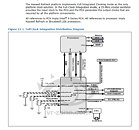- Joined
- Oct 9, 2007
- Messages
- 47,668 (7.43/day)
- Location
- Dublin, Ireland
| System Name | RBMK-1000 |
|---|---|
| Processor | AMD Ryzen 7 5700G |
| Motherboard | Gigabyte B550 AORUS Elite V2 |
| Cooling | DeepCool Gammax L240 V2 |
| Memory | 2x 16GB DDR4-3200 |
| Video Card(s) | Galax RTX 4070 Ti EX |
| Storage | Samsung 990 1TB |
| Display(s) | BenQ 1440p 60 Hz 27-inch |
| Case | Corsair Carbide 100R |
| Audio Device(s) | ASUS SupremeFX S1220A |
| Power Supply | Cooler Master MWE Gold 650W |
| Mouse | ASUS ROG Strix Impact |
| Keyboard | Gamdias Hermes E2 |
| Software | Windows 11 Pro |
Intel's 9-series chipset, which is built for the company's next-generation Core "Broadwell" processor family, and slated for the second half of 2014, may face backwards-compatibility issues with current-generation Core "Haswell" processors, and the ability of current 8-series platforms to support "Broadwell," even though the two processor families share a common LGA1150 CPU socket, according to a VR-Zone report.
The report notes that a number of electrical connections between the CPU socket and chipset are different, and the chip follows a different power supply (as in power distribution within the chip/motherboard) than "Haswell." Such differences could pose backwards-compatibility issues. Although a generation ahead of Haswell, Broadwell isn't its immediate successor. Intel plans to roll out a refreshed Core "Haswell" processor family in a few quarters from now, which in addition to fully-integrated clocking mode, could introduce a few other platform changes. The report notes that 9-series chipset motherboards could be more compatible with Haswell (refresh), than the current Haswell platform. Intel 9-series chipset could introduce support for SATA-Express, the next big consumer internal storage interface that succeeds SATA 6 Gb/s.


View at TechPowerUp Main Site
The report notes that a number of electrical connections between the CPU socket and chipset are different, and the chip follows a different power supply (as in power distribution within the chip/motherboard) than "Haswell." Such differences could pose backwards-compatibility issues. Although a generation ahead of Haswell, Broadwell isn't its immediate successor. Intel plans to roll out a refreshed Core "Haswell" processor family in a few quarters from now, which in addition to fully-integrated clocking mode, could introduce a few other platform changes. The report notes that 9-series chipset motherboards could be more compatible with Haswell (refresh), than the current Haswell platform. Intel 9-series chipset could introduce support for SATA-Express, the next big consumer internal storage interface that succeeds SATA 6 Gb/s.


View at TechPowerUp Main Site







